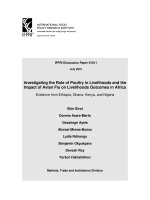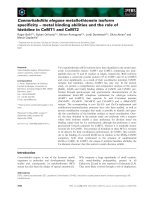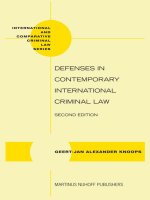The principle of legality in international and comparative criminal law
Bạn đang xem bản rút gọn của tài liệu. Xem và tải ngay bản đầy đủ của tài liệu tại đây (4.45 MB, 632 trang )
This page intentionally left blank
the principle of legality in international
and comparative criminal law
This book fills a major gap in the scholarly literature concerning international
criminal law, comparative criminal law, and human rights law. The principle of
legality (non-retroactivity of crimes and punishments and related doctrines) is
fundamental to criminal law and human rights law. Yet this is the first booklength study of the status of legality in international law – in international
criminal law, international human rights law, and international humanitarian
law. This is also the first book to survey legality and non-retroactivity in all
national constitutions, developing the patterns of implementation of legality in
the various legal systems (e.g., common law, civil law, Islamic law, Asian law)
around the world. This is a necessary book for any scholar, practitioner, and
library in the area of international, criminal, comparative, human rights, or
international humanitarian law.
Kenneth S. Gallant is a professor at the University of Arkansas at Little Rock
William H. Bowen School of Law. His previous positions include professor at
the University of Idaho, prosecutor with the district attorney of Philadelphia,
and clerk for the Hon. Louis H. Pollak of the U.S. District Court, Eastern
District of Pennsylvania and for the Hon. Samuel J. Roberts of the Supreme
Court of Pennsylvania. He has been a Fulbright Scholar at the National Law
School of India University and Tribhuvan University in Nepal. He was elected as
the first representative of counsel on the Advisory Committee on Legal Texts of
the International Criminal Court, was a founding member of the International
Criminal Bar, and was on its first governing council.
cambridge studies in international and comparative law
Established in 1946, this series produces high-quality scholarship in the fields of public
and private international law and comparative law. Although these are distinct legal
sub-disciplines, developments since 1946 confirm their interrelation.
Comparative law is increasingly used as a tool in the making of law at national,
regional, and international levels. Private international law is now often affected by
international conventions, and the issues faced by classical conflict rules are frequently
dealt with by substantive harmonization of law under international auspices. Mixed
international arbitrations, especially those involving state economic activity, raise
mixed questions of public and private international law, while in many fields (such as
the protection of human rights and democratic standards, investment guarantees, and
international criminal law) international and national systems interact. National
constitutional arrangements relating to “foreign affairs,” and to the implementation of
international norms, are a focus of attention.
The Board welcomes works of a theoretical or interdisciplinary character, and those
focusing on the new approaches to international or comparative law or conflicts of law.
Studies of particular institutions or problems are equally welcome, as are translations
of the best work published in other languages.
General Editors
James Crawford SC FBA
Whewell Professor of International Law, Faculty of Law, and
Director, Lauterpacht Research Centre for International Law,
University of Cambridge
John S. Bell FBA
Professor of Law, Faculty of Law, University of Cambridge
Editorial Board
Professor Hilary Charlesworth Australian National University
Professor Lori Damrosch Columbia University Law School
Professor John Dugard Universiteit Leiden
Professor Mary-Ann Glendon Harvard Law School
Professor Christopher Greenwood London School of Economics
Professor David Johnston University of Edinburgh
Professor Hein K¨otz Max-Planck-lnstitut, Hamburg
Professor Donald McRae University of Ottawa
Professor Onuma Yasuaki University of Tokyo
Professor Reinhard Zimmermann Universit¨at Regensburg
Advisory Committee
Professor D. W. Bowett QC
Judge Rosalyn Higgins QC
Professor J. A. Jolowicz QC
Professor Sir Elihu Lauterpacht CBE QC
Judge Stephen Schwebel
A list of books in the series can be found at the end of this volume.
The Principle of Legality in International
and Comparative Criminal Law
KENNETH S. GALLANT
University of Arkansas at Little Rock
CAMBRIDGE UNIVERSITY PRESS
Cambridge, New York, Melbourne, Madrid, Cape Town, Singapore, São Paulo
Cambridge University Press
The Edinburgh Building, Cambridge CB2 8RU, UK
Published in the United States of America by Cambridge University Press, New York
www.cambridge.org
Information on this title: www.cambridge.org/9780521886482
© Kenneth S. Gallant 2009
This publication is in copyright. Subject to statutory exception and to the
provision of relevant collective licensing agreements, no reproduction of any part
may take place without the written permission of Cambridge University Press.
First published in print format 2009
ISBN-13
978-0-511-48059-1
eBook (NetLibrary)
ISBN-13
978-0-521-88648-2
hardback
Cambridge University Press has no responsibility for the persistence or accuracy
of urls for external or third-party internet websites referred to in this publication,
and does not guarantee that any content on such websites is, or will remain,
accurate or appropriate.
To the rule of law as a just and certain guide to human conduct
Brief Contents
Explanatory Note on Spelling
page xix
Acknowledgments
xxi
Introduction
1
1
Legality in Criminal Law, Its Purposes, and Its Competitors
11
2
A Partial History to World War II
46
3
Nuremberg, Tokyo, and Other Postwar Cases
67
4
Modern Development of International Human Rights Law:
Practice Involving Multilateral Treaties and the Universal
Declaration of Human Rights
156
Modern Comparative Law Development: National Provisions
Concerning Legality
231
Legality in the Modern International and Internationalized
Criminal Courts and in the UN Trust Territories
303
Legality in Customary International Law Today
352
Conclusion: The Endurance of Legality in National and
International Criminal Law
404
Appendix A: Chart of Non-retroactivity Provisions in Criminal
Law by Nations
411
Appendix B: Legality and Non-retroactivity Provisions as of 1946–47
425
Appendix C: Constitutional and Other National Provisions
Implementing the Principle of Legality Today
438
Bibliography
541
Table of Authorities
553
Index
579
Afterword and Update
599
5
6
7
viii
Contents
Explanatory Note on Spelling
page xix
Acknowledgments
xxi
Introduction
0.a. Retroactivity, Justice, and Sovereignty
0.b. Plan of This Book
0.b.i. Outline of Chapters
0.b.ii. Principles and Rules: Two Key Definitions
0.c. The Arguments of This Book
0.c.i. The Argument: Non-retroactivity of Crimes
and Punishments
0.c.ii. Some Sub-arguments
0.c.iii. The Meta-argument: Law as Created by
International Criminal Courts and
International Organizations in Light of
Claims Made by Individuals
1
Legality in Criminal Law, Its Purposes, and Its Competitors
1.a. Legality in Criminal Law and the Rule of Law Generally
1.b. Purposes of Legality in Criminal Law
1.b.i. Human Rights Protective Purposes
1.b.ii. Legality and Legitimacy
1.b.iii. Separation of Powers, Democracy, and
Legality in National and International Law
1.b.iv. Legality and the Purposes of Criminalization
1.b.iv.A. Accountability, Restorative Justice, and
Reconciliation: Purposes of Criminal
Law Applying Specifically, but Not
ix
1
1
4
4
6
8
8
9
10
11
14
19
20
23
24
26
x
Contents
Exclusively, to International Criminal
Law and Post-conflict Societies
1.c. Competitors to Strict Legality as a Principle of Law
1.c.i.
Indeterminacy of Language and
Impossibility of Pure Non-retroactivity
1.c.i.A. Statutory Interpretation as Eroding Legality
1.c.i.B. Common Law Development
of Criminal Law
1.c.ii. Crime Creation by Analogy in Civil Law
1.c.iii. Legality as an Optional Principle of Law or Justice
1.c.iv. Legality as a Principle with Limited or No
Binding Effect in International Criminal Law
1.c.v. Legality as Binding in Normal
Circumstances, with Exceptions in
Extraordinary or Transitional Times
1.c.vi. Defenses That Do Not Go to Whether an
Act Is Criminal
1.c.vii. Legality and Prior Establishment of Court Systems
1.c.viii. Change of Name, Character, or Jurisdiction
of Offenses
1.c.viii.A. In International Courts
1.c.viii.B. In National Courts: Domesticating
International Crimes and the Problem
of Representation Jurisdiction
1.c.ix. Collective Punishment or Punishment of Hostages
1.c.x. Authoritarianism and Anti-Legality
2
A Partial History to World War II
2.a. Overview
2.a.i. Civil Law and Common Law
2.a.ii. Islamic Law
2.a.iii. A Note on Japan and China
2.b. Literacy and Accessibility of Criminal Law
2.c. Between the Two World Wars
2.c.i. The Versailles Settlement and Criminal Law
Legality
2.c.ii. Fascist and Communist Attacks on Legality
between the Wars
2.c.ii.A. The End of Legality in the Weimar
Republic’s Laws
30
31
31
33
35
36
38
38
39
39
40
40
41
42
42
44
46
47
47
51
54
55
56
56
59
59
Contents
2.c.ii.B. Danzig’s Abandonment of Legality and
the Permanent Court of International
Justice Response
2.c.ii.C. Other Dictatorships: The Soviet Union
and Italy
3
Nuremberg, Tokyo, and Other Postwar Cases
3.a. Violations of the Laws and Customs of War as Criminal
before Nuremberg: Atrocities and Other Crimes
3.a.i. Beyond Traditional War-Crime Atrocities
3.b. Nuremberg: Searching for Consensus
3.b.i. Anti-legality: Churchill and Morgenthau
Favor Summary Executions
3.b.ii. The London Conference: The French
Oppose Ex Post Facto Crime Creation; the
Americans, Soviets, and British Favor
Plenary Power to Define Crimes
3.b.ii.A. Negotiating the Ex Post Facto Issue
at London
3.b.iii. The Major Nuremberg Trial: Ex Post Facto in
the Indictment and Arguments
3.b.iii.A. The Indictment and Preliminary
Defense Motion
3.b.iii.B. Arguments of the Prosecutors
3.b.iii.C. The Defense Arguments
3.b.iii.C.I. Authority of the Charter versus
the Principle of Legality
3.b.iii.C.II. Crimes against Peace
(Aggressive War) and
Conspiracy
3.b.iii.C.III. War Crimes and Crimes
against Humanity
3.b.iv. The Nuremberg Judgment
3.b.iv.A. The Crime against Peace (Aggressive War
and War in Breach of Treaties) and
Conspiracy
3.b.iv.B. War Crimes
3.b.iv.C. Crimes against Humanity
3.b.iv.D. Summary of the Main Nuremberg
Judgment
xi
62
64
67
69
72
73
73
76
87
91
91
93
99
100
102
104
110
115
117
119
125
xii
Contents
3.c.
3.d.
3.e.
3.f.
3.b.iv.E. Divisions within the Nuremberg
Tribunal? Judges Nikitchenko and
Donnedieu de Vabres
Legality in Other Postwar Cases (Mostly from Europe)
3.c.i Recognition That an Act Is Criminal under
Some Applicable Law When Committed as
the Key to Legality of Crimes
3.c.ii. Against Legality: Retroactive
Criminalization of Moral Wrongs and
Non-criminal Legal Violations
3.c.iii. Retrospective Expansion of Jurisdiction in
the Post–World War II National Courts
3.c.iv. Members of Criminal Organizations in the
Nuremberg Charter and Control Council
Law No. 10: Retroactivity and Collective
Punishment
Legality in the IMTFE (Tokyo Tribunal): Dissensus Revealed
3.d.i. The IMTFE Charter
3.d.ii. The Majority IMTFE Judgment: Based in
Existing International Law?
3.d.iii. The Separate IMTFE Opinions
3.d.iii.A. Justice Jaranilla (Philippines):
Retroactivity Permissible in International
Criminal Law
3.d.iii.B. President Webb (Australia): Retroactivity
May Be Permissible
3.d.iii.C. Justice R¨oling (Netherlands):
Retroactivity Permissible in International
Criminal Law as Alternative to “Political”
Disposition; Nullum Crimen Not a
Principle of Justice
3.d.iii.D. Justice Bernard (France): Natural Law Is
Not Retroactive Law
3.d.iii.E. Justice Pal (India): Against Retroactive
Creation of Crimes; Admitting
Retrospective Creation of Tribunals
If the Nuremberg and Tokyo Judgments Violated the
Principle of Legality, Can They Nonetheless Form the
Basis of Legitimate Law? Justice Pal Answers
Conclusion
126
129
130
134
135
136
139
139
142
143
143
144
144
147
150
152
155
Contents
4
Modern Development of International Human Rights Law:
Practice Involving Multilateral Treaties and the Universal
Declaration of Human Rights
4.a. The Universal Declaration of Human Rights
4.a.i. The Text
4.a.ii. History and Travaux Pr´eparatoires of the
UDHR Non-retroactivity Provision (and
Beginnings of the ICCPR Provision)
4.b. The ICCPR
4.b.i. The Text
4.b.ii. History and Travaux Pr´eparatoires of the
ICCPR Non-Retroactivity Provision
4.b.ii.A. Beginnings, through Spring 1950 (Sixth
Session of the Commission on Human
Rights)
4.b.ii.B. 1952 and Beyond
4.b.ii.C. General Principles of Law: No Exception
to Legality Intended
4.c. The Convention on the Rights of the Child: Universality
of Nullum crimen and Prohibiting Even Accusations of
Retroactive Crime
4.d. The Regional Human Rights Treaties: European,
American, African, Arab
4.d.i. European Convention for the Protection of
Human Rights and Fundamental Freedoms
4.d.ii. American Convention on Human Rights:
Broadening of Procedural Protections
4.d.iii. African Charter of Human and Peoples’
Rights: Against Collective Punishment
4.d.iv. Revised Arab Charter on Human Rights
4.d.v. Charter of Fundamental Rights of the
European Union: Legality Controlling an
International Organization?
4.e. Non-Derogability of Legality in the Treaties
4.f. Legality in the International Humanitarian Law System:
Application to International and Internal Conflicts and
Occupation
4.f.i. Non-retroactivity
4.f.ii. Against Collective Punishments and Hostage
Taking to Ensure Good Behavior
xiii
156
158
158
160
175
175
178
178
188
191
201
202
203
203
205
205
206
206
207
207
211
xiv
Contents
4.g. Reservations to Provisions on Legality by Parties to the
Worldwide Treaties
4.g.i. Lack of Reservations in the Treaties for
Ta’azir Crimes in Islamic Law and Lack of
Persistent Objection
4.h. Limits to Rule of Legality in Modern Treaties: Statutory
Interpretation, Common Law Case Development, and
Civil Law Analogy
4.i. Patterns of Treaty Nonparticipation
4.j. Individual, State, and International Organization Ability
to Raise Legality in Criminal Proceedings as an
International Law Claim under the Treaties
4.k. Status of Actions Discussed in This Chapter under
International Law
5
Modern Comparative Law Development: National Provisions
Concerning Legality
5.a. Content and Limitations of the Material in This Chapter
and the Appendices on National Law
5.b. Legality in Constitutions of the World in 1946–47
5.c. Non-Retroactivity of Crimes and Punishments in
National Legal Systems Today: At Least a General
Principle of Law
5.c.i. Sources of the Requirement of
Non-retroactivity of Crimes and
Punishments in National Law
5.c.ii. Non-retroactivity in the Constitutional
Texts: Act Focus and Law Focus
5.c.iii. Crimes According to International Law and
General Principles of Law in the
Constitutional Non-retroactivity Provisions
and in National Judicial Practice
5.c.iv. Modern Adoption or Readoption of Legality
by Major States That Had Rejected It
5.c.v. Other Legality Issues in the Constitutional Texts
5.c.v.A. Lex mitior, and the Issue of Mixing
Nullum crimen, Nulla poena and
Lex mitior
5.c.v.B. Legality and Freedom in the Modern
Constitutions
5.c.v.C. Lex certa in the Constitutions
213
214
217
224
225
228
231
231
237
241
243
251
261
265
271
271
274
274
Contents
5.d.
5.e.
5.f.
5.g.
6
5.c.v.D. Narrow Interpretation and Analogy in
the Constitutions
5.c.v.E. Retroactive Expansion of National
Jurisdiction: Domestic Incorporation of
Crimes under the Law of Another State
or Crimes under International Law – A
Current Version of Retroactive
Re-characterization?
5.c.vi. Exceptions and Possible Exceptions to
Non-retroactivity of Crimes and Punishments
5.c.vii. Representation (or Vicarious) Jurisdiction: A
Challenge for Legality
5.c.viii.What Is Punishment for Purposes of
Invoking the Non-retroactivity Rules of
Criminal Law? A Brief Note
Non-retroactivity of Court Creation and Prohibitions of
Special Courts
Personal Punishment and Rejection of Collective
Punishment: Also General Principles of Law
The Status of National Constitutions and Other Internal
Legal Acts of States as State Practice for Constituting
Customary International Human Rights Law
The Transformation of Legality in National Law since
World War II
Legality in the Modern International and Internationalized
Criminal Courts and in the UN Trust Territories
6.a. Legality in the ICTY, ICTR, and SCSL (and the Nascent
Lebanon Tribunal)
6.a.i. Non-retroactivity (Nullum crimen, nulla
poena sine lege) in These Courts Generally
6.a.i.A. The Special Case of Contempt in the ICTY
6.a.ii. Legality as a Jurisdictional and Substantive
Issue, Right of the Individual to Complain,
and the International Legal Personality of
the Individual
6.a.ii.A. Claim of Violation of Non-retroactivity
as Issue Individuals May Raise and Court
Must Consider
6.a.ii.B. Argument That Court Created by an
International Organization Should Not
xv
275
276
278
282
287
290
293
299
301
303
304
305
309
311
312
xvi
Contents
Examine Whether a Prosecution Is
Prohibited by Rule of Nullum crimen, so
Long as the Crime Is Named in the
Organic Documents of the Court
6.a.iii. Legality of Courts
6.a.iii.A. Claims That These Courts Are Not
Established by Law: Powers of
International Organizations, the
International Legal Personality of
Individuals, and the Issue of Special Courts
6.a.iii.B. Creating New Jurisdictions Retrospectively
6.a.iv. Retroactive Re-characterization of Crime in
These Tribunals?
6.a.v. Note on Legality in the Special Tribunal for Lebanon
6.b. Legality in the Internationalized Tribunals and a Note on
Legality in Internationally Supervised Trust Territories
6.b.i. The Internationalized Tribunals
6.b.ii. A Note on Legality in UN Trust Territories as
Another Example of International
Organization and National Practice
6.c. The ICC and the Principle of Legality
6.c.i. Situations Involving Only States Parties to
the ICC Statute at All Relevant Times
6.c.ii. Security Council Referrals of Situations
Involving Nonparty States and Retroactive
Acceptances of Jurisdiction by States
6.c.iii. Legality as a Jurisdictional Issue in the ICC
6.d. Status of Actions of the Security Council, Other UN
Bodies, and the Recent International Criminal Courts and
Tribunals under International Law
6.d.i. Practice and Opinio juris of International
Organizations, Including International
Tribunals, as Contributing to Customary
International Law and General Principles of Law
7
Legality in Customary International Law Today
7.a. The Core Rules of Legality in Customary International Law
7.b. Elaboration of the Core Rules: Nullum crimen
7.b.i. Foreseeability
7.b.i.A. Indeterminacy of Language and the
Necessity of a Foreseeability Doctrine
314
316
316
318
320
324
325
325
330
331
333
337
343
344
347
352
352
357
359
359
Contents
7.b.i.B. Foreseeability and the Development of
Criminal Law by Judicial Decision,
Statutory Interpretation, and Analogy
7.b.i.C. Foreseeability, Lex certa, and the
Void-for-Vagueness Doctrine
7.b.i.D. Foreseeability and Accessibility
7.b.i.E. Dangers of the Foreseeability Doctrine
and Limitations on the Doctrine
7.b.ii. Re-characterization in International and
National Courts
7.b.ii.A. Retroactive Re-characterization of a
Crime as International, or as a Different
Type of International Crime, in National
or International Courts
7.b.ii.B. Legality and the Debate over Direct
Application of International Criminal
Law in National Courts
7.b.ii.C. Universal Jurisdiction over International
Law Crimes
7.b.ii.D. Representation (Vicarious) Jurisdiction
and Legality
7.b.ii.E. Purely National Re-characterization
7.b.iii. General Principles of Law as a Source of
Applicable Criminal Law
7.b.iv. Criticism of International Criminal Law as
Generally Violating Principles of Legality
7.b.v. Defenses
7.b.vi. The Right Not to Be Prosecuted
7.c. Elaboration and Discussion of the Core Rules: Nulla poena
7.c.i. Nulla poena as Applicable to Crimes under
International Law
7.c.ii. Criticism of Nulla poena as Inapplicable to
International Criminal Law
7.c.iii. Nulla poena and Re-characterization
7.c.iii.A. Nulla poena Where There Has Been a
Retroactive Re-Characterization of a
National Crime into an International Crime
7.c.iii.B. Nulla poena and Re-characterization of
Crimes in National Courts: Universal
Jurisdiction over International Law Crimes
xvii
360
362
363
364
367
367
369
370
371
372
373
374
375
376
378
379
383
389
389
390
xviii
Contents
7.d.
7.e.
7.f.
7.g.
7.h.
7.i.
7.j.
7.c.iv. Nulla poena and Representation (Vicarious)
Jurisdiction
7.c.v. Nulla poena and General Principles of Law
7.c.vi. Nulla poena as Applying to Punishments
Only, and Not to Other Sanctions
Nullum crimen, Nulla poena as Binding International
Organizations and International Courts
Legality and Jurisdiction of Courts
7.e.i. Creation of New Courts or Expansion of
Jurisdiction of Existing Courts
7.e.ii. Requirement that Court Be Established by Law
Personality of Punishment and Prohibition of Collective
Punishments
Right of the Individual to Raise Claim of Violation of
Legality as a Matter of International Law, and the
International Legal Personality of Individuals
International Law Legality, National Law Legality, and the
Prosecution of Core International Law Crimes in
National Courts
Jus cogens Status for Non-retroactivity of Crimes and
Punishments?
International Organizations as Participants
in the Process of Creating Customary and Other Binding
International Law
391
391
392
393
394
394
395
395
397
398
399
402
Conclusion: The Endurance of Legality in National and
International Criminal Law
404
Appendix A: Chart of Non-retroactivity Provisions in Criminal Law
by Nations
411
Appendix B: Legality and Non-retroactivity Provisions as of 1946–47
425
Appendix C: Constitutional and Other National Provisions
Implementing the Principle of Legality Today
438
Bibliography
541
Table of Authorities
553
Index
579
Afterword and Update
599
Explanatory Note on Spelling
In this book a number of inconsistencies of spelling, capitalization, and
typeface appear. Where quoting from or citing to written sources, it uses
the spelling of the original source. This being the case, one may well find
judgment and judgement, offense and offence, defense and defence, recognize
and recognise, Quran and Koran, crimes against humanity, Crimes against
Humanity and Crimes Against Humanity, and other inconsistencies scattered throughout this book.
Many of these inconsistencies arise from differences between American English and spelling elsewhere in the English-speaking world. I am an
American, but most UN sources, the Statute of the International Criminal
Court, and many other documents related to international human rights
law, international humanitarian law, and international criminal law use
British spellings in their English-language texts. Other inconsistencies, such
as the fact that a single place in Germany is called Nuremberg, Nuernberg,
N¨urnberg, and Nurnberg, arise from the use of these different spellings
and transliterations in the sources. As suggested by the Cambridge University Press editors, I use the popular English spelling Nuremberg, except in
quotes and names of documents. Indeed, I generally use the style suggested
by the Cambridge University Press editors, except for quotes and names
of documents, for capitalization, typeface, diacritical marks, and similar
matters.
The citations in this book involve documents from almost two hundred
countries and several international organizations and treaty systems. Secondary sources are from many countries and include internal references to
books in several languages and books that are long out of print. I have not
eliminated all inconsistency in the form of citations.
xix
xx
Explanatory Note on Spelling
To paraphrase Mark Twain, I make this explanation for the reason that
without it the reader might suppose that my sources and I were attempting
to spell words consistently and not succeeding.
– The Author
Acknowledgments
I appreciate the help and encouragement that I have received in working on
this book. Chief among those are people who encouraged me first to start
doing it, and then to declare it finished and stop doing it. These include Mary
Beth Lagenaur, Mark Drumbl, Tom Sullivan, and Gene Mullins. My friends
and colleagues at the International Criminal Bar, especially its founding
President, Elise Groulx, have helped me develop an understanding of the
challenges of international criminal law in practice.
Other people who have given me especially useful feedback on one
stage or another of the drafts include (in alphabetical order) Diane Marie
Amann, Hans Bevers, Neils Blokker, Roger Clark, Lynn C. Foster, Haider Ala
Hamoudi, Leila N. Sadat, and Joshua M. Silverstein. I have also received a
hearing and support from the rest of the faculty at the University of Arkansas
at Little Rock William H. Bowen School of Law.
Kathryn Fitzhugh, Professor of Law Librarianship at the University of
Arkansas at Little Rock William H. Bowen School of Law; Melissa Serfass,
Professor of Law Librarianship, also at UALR Bowen School of Law; and Jeff
Woodmansee helped with finding and obtaining sources. Prof. Fitzhugh
was especially important in finding many of the international statutes
cited. Student research assistants who worked on this, especially on cite
and fact checking and gathering the constitutional provisions in Appendix C, included Aarol Tyler Broyles, Mosemarie D. Boyd, Christine M.
Hendrickson, Timothy E. Semotan, Samuel P. Trenchi, Joseph D. Tobler,
Lawrence E. Moore III, and Adam G. Weeks.
All of the people listed above have contributed to this book, though many
of them disagree with a few or many of its points. None of them can be
blamed for any of its remaining errors.
I also gratefully acknowledge financial support including research grants
and support for student assistance from the University of Arkansas at Little
Rock William H. Bowen School of Law.
xxi
Introduction
0.a. retroactivity, justice, and sovereignty
The English-language version of the Nuremberg Judgment observes,
[T]he maxim nullum crimen sine lege is not a limitation of sovereignty, but
is in general a principle of justice.1
This statement – that “nothing is criminal except by law [existing at the time
of the act]” is a mere nonbinding principle of justice – has a cynical ring to
it. It implies that judges can and should ignore principles of justice in service
of the sovereign powers that created their court. This was pointed out rather
explicitly in the dissent to the Tokyo Judgment by Justice Radhabinod Pal of
India, who argued that the International Military Tribunal for the Far East
should not create crimes that did not exist at the time a defendant acted:
“for otherwise the Tribunal will not be a ‘judicial tribunal’ but a mere tool
for the manifestation of power.”2 The depth of the disagreement over the
issue of retroactivity might be judged by Justice Pal’s use of this statement. It
refers to – and perhaps parodies – a similar passage by Lord Wright. Wright
had argued that all the crimes in the Nuremberg Charter (and hence in
1
United States v. G¨oring, Judgment of 30 September 1946, 1 Trial of the Major War
Criminals Before the International Military Tribunal: Nuremberg 14 November 1945–1 October 1946 171, 219 (Nuremberg: International Military Tribunal 1947)
[hereinafter IMT, Trial].
2
United States v. Araki, Dissenting Opinion of Radhabinod Pal at 36, 109 The Tokyo Major
War Crimes Trial: The Judgment, Separate Opinions, Proceedings in Chambers,
Appeals and Reviews of the International Military Tribunal for the Far East
(John R. Pritchard, ed., Robert M. W. Kemper Collegium & Edwin Mellen Press 1998)
(November 1948) [hereinafter IMTFE Records] (the pagination of the separate opinions
in this case is problematic, as they are not consecutive with the rest of the trial or each
other).
1









